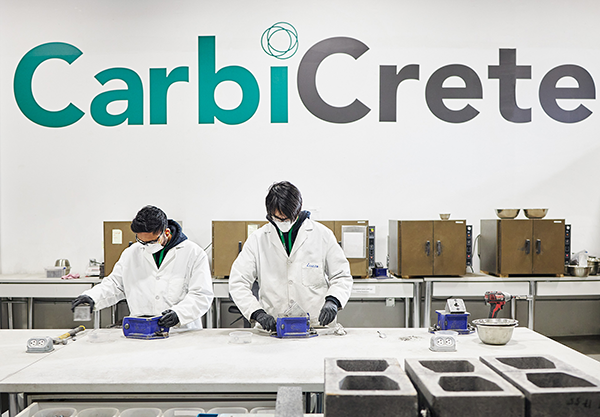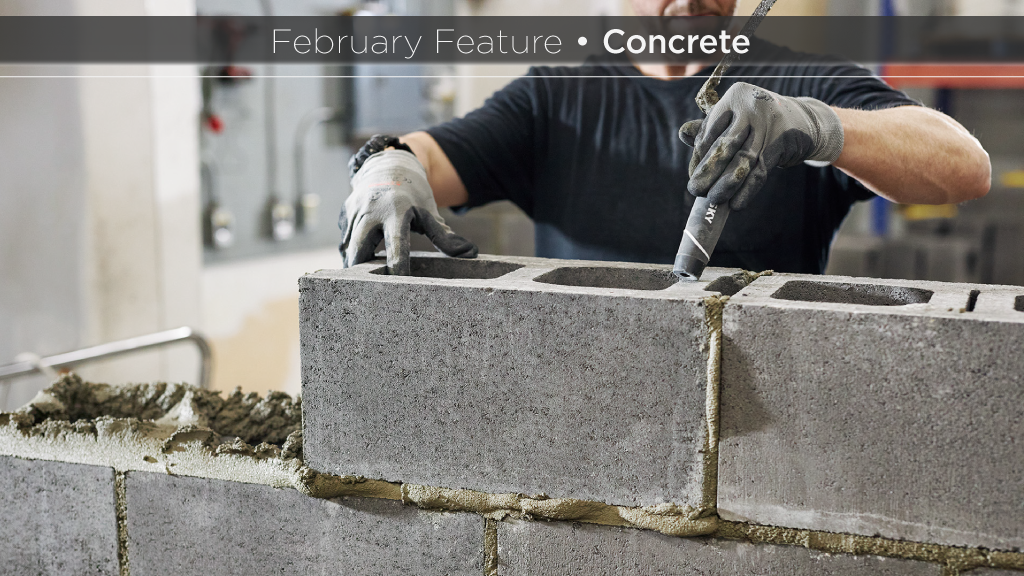Montreal-based CarbiCrete, a pioneer in the development of decarbonized concrete, has announced its new Ontario manufacturing partner Canal Block will soon begin producing CarbiCrete blocks for the provincial market.
CarbiCrete’s carbon-negative process for the production of concrete masonry replaces cement with steel slag, a steel-making byproduct, and cures the product with carbon dioxide, permanently sequestering CO2 within the resulting concrete products.
Manufacturer Patio Drummond of Drummondville, Que. became the first producer of CarbiCrete products for the market in September 2023 following a period of piloting production and CarbiCrete has ramped up announcements of funding, licensing and distribution collaborations in the 18 months since.
Meta signs on
Aecon, Lafarge and tech giant Meta have all been unveiled as supporters and partners during that period and CarbiCrete has announced deals to work with licensees and distributors in the U.S. and France in recent months.
Meta utilizes significant concrete to build its data centres, CarbiCrete’s chief marketing officer Yuri Mytko said in an interview, and the firm is interested in reducing its carbon footprint.

“Decarbonizing hard-to-abate sectors like concrete is an important part of our strategy to achieve net-zero emissions across our value chain in 2030,” stated Devon Lake, head of net-zero strategy at Meta, in a release.
Mytko said Kraft Curing is making good progress at Canal Block installing curing equipment for the production of CarbiCrete concrete blocks. He said Canal Block, located in Port Colborne, is poised to begin block production within months.
Positive momentum
“There’s lots of activity on lots of fronts, all very positive momentum,” said Mytko. “We’re active in both Quebec and Ontario and hoping to finalize some deals in the U.S. as well, in addition to some European pilots that we’re working on.
“It’s exciting times.”
Mytko has been with CarbiCrete since its early days a decade ago. The firm’s patented technology was originally developed at McGill by Mehrdad Mahoutian. He found that steel slag could be used as a one-to-one replacement for cement when ground to the correct consistency.
Mahoutian, now CarbiCrete’s CTO, teamed up with cleantech enterpreneur Chris Stein to found the firm.
Several years ago CarbiCrete identified Patio Drummond, a hardscape manufacturer that produces patio stones, blocks and agricultural products, as its pilot partner.
The federal and Quebec governments became interested as funding partners and in 2022, CarbiCrete closed out a successful Series A funding round that included French manufacturer Saint-Gobain, which aims to take the technology to France.
Mytko said over the past 10 years the team has been relentlessly focused on product optimization.
The R&D has included research on particle size, the conditions required for the curing chamber, including heat and humidity parameters, and then struggling with the pressure requirements of the chamber.
A major breakthrough came when the process was tweaked to enable curing at regular atmospheric pressure — all that was required was a good seal of the chamber.
“That was a real game changer for us,” said Mytko.
The early chambers were over-engineered, he said, but eventually costs were brought down to make the product competitive.
Testing to ensure the product could achieve international green building standards was also imperative. CarbiCrete blocks have been shown to achieve a Global Warming Potential 20 times lower than the industry average and they are recognized by the LEED program.
Carbicrete recently entered into a partnership agreement with 3Degrees, a climate consultant, to oversee the verification of carbon reductions.
Mytko said the Canal Block plant, on the Niagara peninsula, offers a window into the lucrative Toronto market and easy access to raw materials including steel slag.
Despite the continental market uncertainty created by the Trump administration, Mytko said CarbiCrete’s business model generally involves licensing of its technology to concrete makers, so that in most instances, CarbiCrete products for the U.S. will be produced in the U.S. by American manufacturers — thus sheltered from possible tariffs.
Mytko said over the past 10 years the concrete sector has gone from not realizing there was a carbon problem to embracing new solutions with enthusiasm.
“We’re definitely seeing a shift in the industry,” he said.
“It’s a very interesting space to be in at this moment.”





Recent Comments